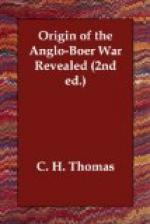When the Transvaal Government had secured the assent of both Volksraads to the seven years’ franchise measure it was thought desirable, as a matter of form and to gain time, to defer the formal passing of the law until after it had been referred to the burghers. This was not done till August last. A large section of the people were known to be against extending the franchise, but the Government had no misgivings about the result, counting upon the persuasive influence of the Volksraad members who were to preside at the plebiscite meetings, and had before been drilled up to their task. Their success was as desired, and the measure became law in due course. Those meetings in the different districts and wards of the State were characterised by almost uniform proceedings, so that the description of one of them can serve for all.
The burghers assembled on the appointed day at the local Government Office. The Landdrost, or chief official of the ward, took the chair. There were four Volksraad members, who each in turn recommended the adoption of the seven years’ franchise measure. The burghers were invited to express their views. The majority appeared dead against it, but were gradually appeased, and they finally assented to a motion of approval presented by the chairman, which also conveyed full confidence in the Government and their representatives to deal with the enactment and to modify it as they might consider appropriate.
One of the burghers had in his speech stated in passionate terms that no dictation on the part of Uitlanders could be tolerated; they must either obey the laws or leave the State. The function and prerogative of making laws belonged to the burghers. They had been ill-used enough by the English; it would be still worse, he said, if they were invested with legislative rights. “On the contrary, it is the Boer nation which is entitled to supremacy, not only in the Transvaal but right to the sea. The Cape Colonies,” he continued, “are ours by divine right, and so is Natal, and no Afrikaner may rest until we are reinstated.” General approbation and stamping of feet followed that passionately rendered speech. Not a word of restraint or censure from any of the four Volksraad members. Some of these had addressed the meeting already, and the others in turn followed. Their speeches had one import, viz., “Burghers! The Government and the two Volksraads have carefully and prayerfully weighed this seven years’ franchise measure. You may safely approve of it; it can result in no harm; it will strengthen our cause. We know that England wants our land because of the gold in it; but this law will contribute to thwart her, though it will not avert war. We were a small nation when our fathers trekked to this side of the Orange River; we have become united and strong since. It will be soon seen that our people have to be reckoned with among the other nations of the earth; we have right on our side, and, with God’s help, we are certain to prevail. Burghers, you may trust us as your representatives; we are all of one mind with you; you may safely approve of the proposed franchise law, and leave possible modifications in the hands of the Government.” Then followed tumultuous approval from the great majority, motions of confidence and of thanks. Those burgher meetings were convened during July and August.




